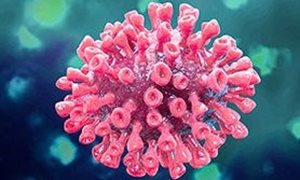 In Journal of Antimicrobial Chemotherapy Mike Ruth, Jakko van Ingen and colleagues showed, using the hollow fiber pharmacodynamic model, that minocycline may be useful to treat pulmonary diseases caused by Mycobacterium avium complex bacteria. This opportunistic infection is increasing in prevalence and outcomes of current treatment regimens are very poor. Minocycline is an old, safe and well tolerated antibiotic that may improve treatment outcomes.
In Journal of Antimicrobial Chemotherapy Mike Ruth, Jakko van Ingen and colleagues showed, using the hollow fiber pharmacodynamic model, that minocycline may be useful to treat pulmonary diseases caused by Mycobacterium avium complex bacteria. This opportunistic infection is increasing in prevalence and outcomes of current treatment regimens are very poor. Minocycline is an old, safe and well tolerated antibiotic that may improve treatment outcomes.
Abstract
Objectives
Our aim was to identify the pharmacokinetic/pharmacodynamic parameters of minocycline in the hollow-fibre system (HFS) model of pulmonary Mycobacterium avium complex (MAC) and to identify the optimal clinical dose.
Methods
Minocycline MICs for 55 MAC clinical isolates from the Netherlands were determined. We also co-incubated primary isolated macrophages infected with MAC with minocycline. Next, we performed a 28 day HFS-MAC model dose-response study in which we mimicked pulmonary concentration-time profiles achieved in patients. The HFS-MAC model was sampled at intervals to determine the minocycline pharmacokinetics and MAC burden. We identified the AUC0-24/MIC ratios associated with 1.0 log10 cfu/mL kill below day 0 (stasis), defined as a bactericidal effect. We then performed 10 000 Monte Carlo experiments to identify the optimal dose for a bactericidal effect in patients.
Results
The MIC for 50% and 90% of cumulative clinical isolates was 8 and 64 mg/L, respectively. Minocycline decreased MAC bacterial burden below stasis in primary isolated macrophages. In the HFS-MAC model, minocycline achieved a microbial kill of 3.6 log10 cfu/mL below stasis. The AUC0-24/MIC exposure associated with a bactericidal effect was 59. Monte Carlo experiments identified a minocycline susceptibility MIC breakpoint of 16 mg/L. At this proposed breakpoint, the clinical dose of 200 mg/day achieved the bactericidal effect exposure target in ∼50% of patients, while 400 mg/day achieved this in 73.6% of patients, in Monte Carlo experiments.
Conclusions
Minocycline at a dose of 400 mg/day is expected to be bactericidal. We propose a clinical trial for validation.
publication
Minocycline treatment for pulmonary Mycobacterium avium complex disease based on pharmacokinetics/pharmacodynamics and Bayesian framework mathematical models.
Ruth MM, Magombedze G, Gumbo T, Bendet P, Sangen JJN, Zweijpfenning S, Hoefsloot W, Pennings L, Koeken VACM, Wertheim HFL, Lee PS, van Ingen J, Deshpande D.
Mike Ruth and Jakko van Ingen are members of theme Infectious disease and global health.
Related news items

NIH grant for follow-up research on tuberculous meningitis
10 February 2022Met subsidie van het Amerikaanse NIH gaat With a grant from the U.S. NIH, Reinout van Crevel will continue to unravel the disease process of tuberculous meningitis.
go to page
Chronic malaria infections produce more and more infectious gametocytes
28 April 2021 In a recent article in Nature Communications, researchers from the department of Medical Microbiology uncovered intriguing dynamics in the production of the transmission stages of malaria parasites, gametocytes. go to page
Rob Aarnoutse is appointed as professor in Translation pharmacology of antimicrobial agents in particular drugs for tuberculosis
25 January 2021Hospital pharmacist and clinical pharmacologist Rob Aarnoutse is appointed as professor in ‘Translation pharmacology of antimicrobial agents, in particular drugs for tuberculosis’ at Radboud University / Radboudumc, starting 16 November 2020.
go to page
Invasive fungal infections in influenza and COVID-19
8 July 2020 The Aspergillus fungus is found in the lungs of many COVID patients. A parallel occurs with influenza patients, who often develop a serious fungal infection. Although such a serious fungal infection seems to occur less frequently in COVID-patients, alertness remains necessary, go to page
Early symptoms in Radboudumc healthcare workers who were tested for SARS-CoV-2
12 May 2020 In Eurosurveillance RIHS researcher Alma Tostmann and colleagues from the Radboudumc COVID-19 Team describe that general symptoms like fever, headache, general malaise and muscle ache were associated with a positive SARS-CoV-2 test. Respiratory symptoms however, were not predictive for SARS-CoV-2. go to page
ESCMID award for groundbreaking studies on NTM disease
18 April 2019Jakko van Ingen received the ESCMID Young Investigator Award for his groundbreaking work on nontuberculous mycobacterial disease.
go to page